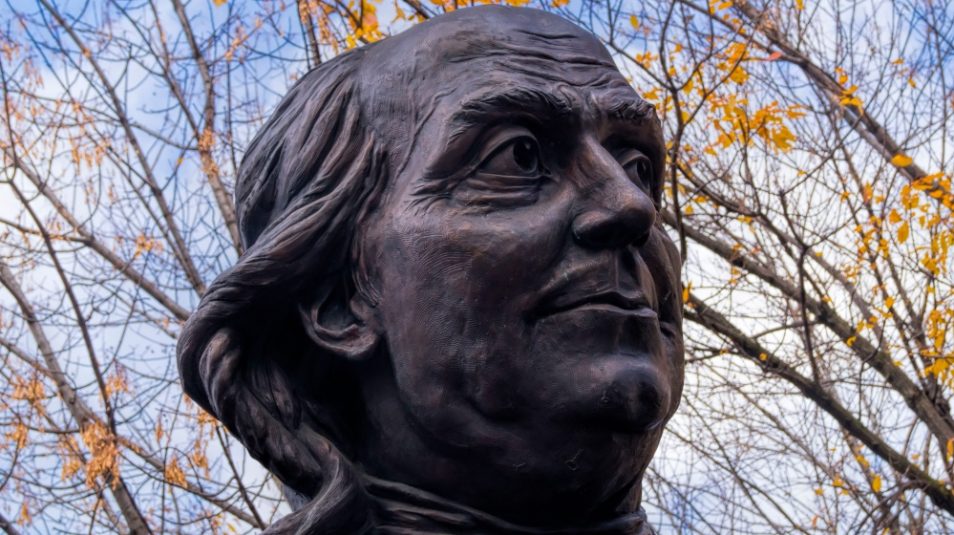Improve Yourself the Ben Franklin Way

Personal Development
July 20, 2018
Wally Bock
Author + Blogger + Ghostwriter + Writing Coach
Topics
13 virtues, Benjamin Franklin, morals, morning ritual, self improvementBenjamin Franklin packed a lot of achievement into his 84 years. He was a successful entrepreneur, a scientist who made important discoveries, an inventor, an author, and a statesman. He made “small but important changes” to Thomas Jefferson’s first draft of the Declaration of Independence. He helped found the institution that became the University of Pennsylvania.
What’s truly amazing is that Franklin accomplished all that even though his formal education ended when he was ten years old. He was passionate about learning and about self-improvement. That makes him one of the best models for self-improvement you’re likely to come across. Here are some ways you can follow his example and improve yourself like Ben Franklin.
Read . . . A Lot
Ben Franklin was a voracious reader, like most successful people. He says:
“From a child I was fond of reading, and all the little money that came into my hands was ever laid out in books.”
Reading provided a lot of his learning, but he learned a lot from other people, too.
Learn from Others
Franklin set up what he called his “club of mutual improvement” and named it the “Junto.” He recruited fellow passionate learners, and they set up a group that met every Friday night to debate, discuss, and learn from each other. Members were expected to bring questions for the group to every meeting. Every member had to write an essay for the club to discuss every three months.
Special Learning Projects
In addition to his reading and his learning from the Junto, Franklin conducted several intense learning projects. My favorite is the way he learned to write well.
The Spectator was a periodical published by Joseph Addison and Richard Steele. Here’s Franklin’s description of how he learned to write well, using the Spectator articles as a model.
"I thought the writing excellent, and wished, if possible, to imitate it. With this view I took some of the papers, and, making short hints of the sentiment in each sentence, laid them by a few days, and then, without looking at the book, try'd to compleat the papers again, by expressing each hinted sentiment at length, and as fully as it had been expressed before, in any suitable words that should come to hand. Then I compared my Spectator with the original, discovered some of my faults, and corrected them.”
He repeated this process, with variations, until his own writing was excellent.
A Daily Routine
Franklin decided that he would get more done if he had a regular daily routine. He outlined an ideal day where, “Every part of my business should have its allotted time.”
There was a specific morning routine. Franklin planned his business for the day and made a “resolution for the day.” Then he worked on his latest self-improvement project until it was time for breakfast.
Seeking Moral Perfection
I think the most fascinating of all of Franklin’s self-improvement projects is what he termed “the bold and arduous project of arriving at moral perfection.”
He identified 13 virtues. Every day, he counted the number of times he violated each one.
That’s remarkable enough. Simply paying attention to how we act helps us to act more like we want to. But Franklin went a step further.
Each week, he chose one of the 13 virtues to concentrate on. Every day, he tried to act in accord with that virtue and not violate it at all. He noted his transgressions against the other virtues, but he concentrated on doing one perfectly. That way, he worked through the full cycle of the virtues every 13 weeks, four times a year.
Bottom Line
Benjamin Franklin was a master of self-improvement. If you want to follow in his footsteps, read a lot and find ways to learn from and with other people. Organize your daily routine so that you’re most likely to get everything done you need to. Start your day with a morning ritual. Track your performance so you get better.






This is a very helpful article Mr.Wally.
Reading has helped me a lot in my self-improvement journey and it is one thing which common between leaders.
It was a good experience to know about this topic with the perspective of Ben Fraklin.
Loved it!